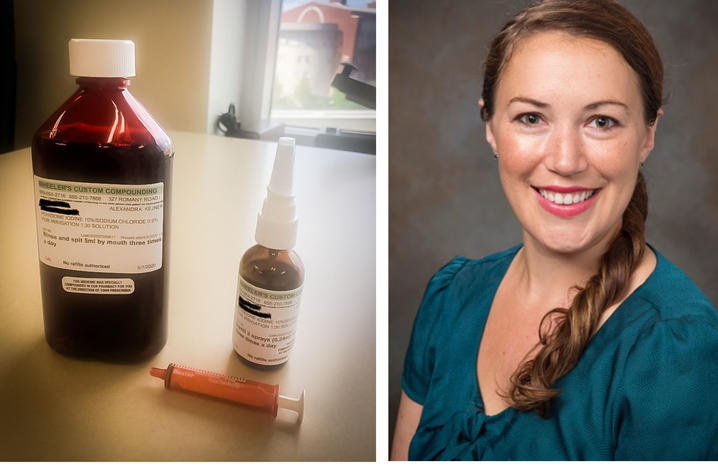Clinical Trial Looks at Antiseptic Nasal Spray and Gargle to Prevent COVID-19 Infections
LEXINGTON, Ky. (June 10, 2020) – As the COVID-19 pandemic continues, researchers at the University of Kentucky are exploring the use of an antiseptic nasal spray and gargle to prevent transmission and infection of the virus among healthcare workers and non-COVID patients. The PIIPPI trial, which stands for Povidone-Iodine Intranasal for Prophylaxis in front-line Physicians/health care workers and Inpatients, is the first in the country to study iodine as a prevention measure in people who are not COVID-positive.
The study is led by Dr. Alexandra Kejner, assistant professor in the UK Department of Otolaryngology - Head and Neck Surgery; Laura Ebbitt, assistant professor in the UK Department of Pharmacy Practice & Science; Dr. Nikita Gupta, assistant professor in the UK Department of Otolaryngology - Head and Neck Surgery; and Dr. Zachary Porterfield, assistant professor in the UK Department of Microbiology, Immunology & Molecular Genetics.
Because front-line health care workers are involved in high-risk procedures, and in some cases are reusing personal protective equipment, like masks, and because patients are also at risk of infection, the researchers say finding ways to reduce viral load and viral exposure are paramount. Iodine is an established antiseptic against other viruses and is currently being studied for potentially reducing viral load among people who have active COVID infections.
“Given that health care workers and inpatients are at high risk for contracting SARS-CoV2, the virus responsible for the COVID-19 pandemic, we are assessing the efficacy of a specific nasal and oral preparation to prevent the spread and contracting of infection," said Kejner, principle investigator for the study. "Povidone iodine—in the specific concentration and preparation we are studying—has been shown to be safe, well-tolerated and to have efficacy against SARS and MERS.
"So we wanted to investigate if it would work on this virus. As with any medication/preparation, this will be performed under medical supervision in order to make sure we do things the safest way possible in a monitored setting.”
Participants in the clinical trial will be swabbed to assess for active infection and then started on the nasal spray and gargle if eligible. They will be retested at the end of the trial period or when/if they develop symptoms consistent with COVID-19.
“It is important to study potential treatments and preventions before recommending them to the general public in order to ensure safety and efficacy," said Kejner. "We are currently in a worldwide emergency and it is imperative to explore various forms of prevention and treatment in order to help our coworkers and patients.”
All front-line health care workers at UK HealthCare are eligible to participate unless they have previously had a positive test for the novel coronavirus. These participants will be given pre-made gargles and nasal spray to be used prior to the start of their shift, during "lunch break" and at the end of their shift. First, the nasal spray will be sprayed in the nose. For adequate coverage, the participant should be able to taste the iodine or see it in the back of the throat. This should be left in place for 30 seconds. Then, the participant will gargle the solution for 30 seconds and not have anything to eat or drink by mouth for 30 minutes. They will also complete daily questionnaires. The trial period for health worker participants is three weeks.
Health care workers who are pregnant, nursing, have thyroid cancer/disorder, or a shellfish allergy can still participate but will be automatically put into the control group, which only uses standard PPE and not the nasal spray or gargle.
For patients participating in the study group, gargle and nasal sprays will be applied preoperatively or, in non-operative patients, shortly after admission to the hospital. The patients will then be retested in two weeks or as directed by the presentation of COVID symptoms.
The researchers say that if the clinical trial shows that the nasal spray and gargle are effective in preventing the spread of infection, it could provide a form of chemical personal protection for health care workers and patients.
“By studying the efficacy and safety of the preparation, we can potentially protect our healthcare workers and inpatients with a proven agent," Kejner said. "It is of utmost importance to do this in a monitored setting as we will be assessing participants’ other medical issues prior to enrollment to make sure the preparation does not interfere with other medications or health conditions."
The work on this trial is funded by an internal grant from the UK College of Medicine's CURE (COVID-19 Unified Research Experts), also known as the UK CURE Alliance, a collaboration with the UK Center for Clinical and Translational Science.
If you want more information regarding this study, please contact: Alexandra.kejner@uky.edu, nikita.gupta@Uky.edu, or Zach.porterfield@uky.edu.
As the state’s flagship, land-grant institution, the University of Kentucky exists to advance the Commonwealth. We do that by preparing the next generation of leaders — placing students at the heart of everything we do — and transforming the lives of Kentuckians through education, research and creative work, service and health care. We pride ourselves on being a catalyst for breakthroughs and a force for healing, a place where ingenuity unfolds. It's all made possible by our people — visionaries, disruptors and pioneers — who make up 200 academic programs, a $476.5 million research and development enterprise and a world-class medical center, all on one campus.






